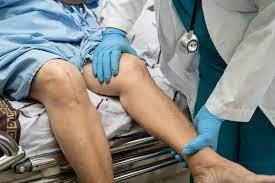How to Reduce Pain After Hip and Knee Surgery in Karachi?

Undergoing hip or knee surgery is a significant step toward improving mobility and quality of life, but the recovery process can involve discomfort and pain. Managing pain effectively after surgery is crucial for a smoother recovery. Here are some strategies to help you reduce pain after hip and knee surgery in Karachi.
1. Follow Post-Operative Instructions
Your orthopedic surgeon will provide specific post-operative care instructions tailored to your surgery. This may include guidelines on medication, activity restrictions, and physical therapy exercises. Adhering to these recommendations is essential for minimizing pain and ensuring proper healing.
2. Use Pain Medications as Prescribed
Pain management typically involves the use of medications. Your doctor may prescribe pain relievers or recommend over-the-counter options. Take medications as directed to manage pain effectively, and don’t wait until the pain becomes severe. If you have concerns about side effects or efficacy, discuss them with your surgeon.
3. Apply Ice Packs
Applying ice packs to the surgical site can help reduce swelling and numb the area, providing relief from pain. Use a cloth or towel to wrap the ice pack to avoid direct contact with the skin, and apply it for 15-20 minutes every couple of hours during the initial days of recovery.
4. Elevate Your Leg
Keeping your leg elevated can help minimize swelling and discomfort. Use pillows to prop your leg up when resting or sleeping, ensuring that it is above heart level. This position helps improve blood circulation and reduces pressure on the surgical site.
5. Engage in Gentle Movement
While it’s important to rest after surgery, gentle movement can help alleviate stiffness and pain. Follow your surgeon’s guidance on when and how to start moving. Simple activities like ankle pumps and leg raises can promote circulation and prevent stiffness.
6. Participate in Physical Therapy
Physical therapy plays a vital role in recovery after hip and knee surgery. A qualified physical therapist in Karachi can guide you through exercises designed to strengthen muscles, improve flexibility, and enhance overall function. Engaging in therapy as prescribed can significantly reduce pain and improve mobility.
7. Practice Relaxation Techniques
Stress and anxiety can amplify pain perception. Incorporate relaxation techniques into your recovery routine, such as deep breathing exercises, meditation, or gentle yoga. These practices can help calm your mind and body, making it easier to manage discomfort.
8. Maintain a Healthy Diet
Nutrition plays an important role in recovery. Focus on a balanced diet rich in vitamins, minerals, and protein to support healing. Foods high in omega-3 fatty acids, antioxidants, and calcium can help reduce inflammation and promote overall health. Staying hydrated is also essential for recovery.
9. Avoid High-Impact Activities
While it’s crucial to move gently, avoid high-impact activities that could stress your joints and lead to pain. Follow your surgeon’s advice regarding activity restrictions, especially during the initial recovery period.
10. Use Assistive Devices
If you have difficulty walking or moving around, consider using assistive devices such as crutches, walkers, or canes. These tools can help you maintain stability and reduce the risk of falling, which can lead to further pain and complications.
11. Communicate with Your Healthcare Team
Open communication with your healthcare team is key to managing pain effectively. If you experience severe pain or have concerns about your recovery, contact your orthopedic surgeon or healthcare provider for guidance. They may adjust your pain management plan or recommend additional interventions.
Conclusion
Recovering from hip or knee surgery can be challenging, but with the right strategies, you can effectively manage pain and enhance your healing process. By following post-operative instructions, engaging in physical therapy, and practicing relaxation techniques, you can work toward a smoother recovery journey. Remember that recovery is a gradual process, and patience is essential. Prioritize your well-being, and soon you’ll be on your way to regaining mobility and enjoying life again.



